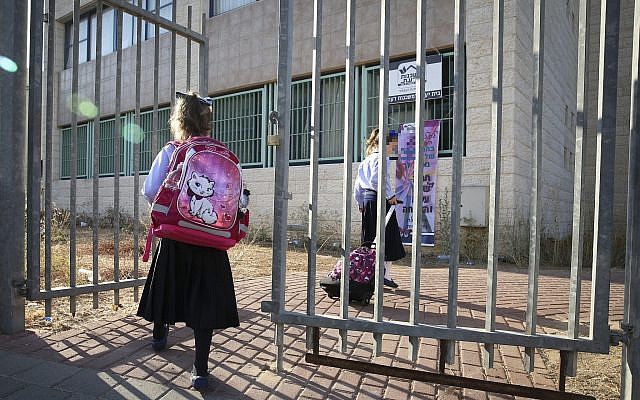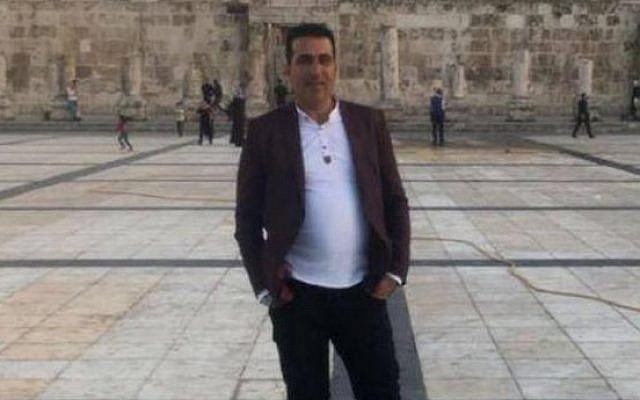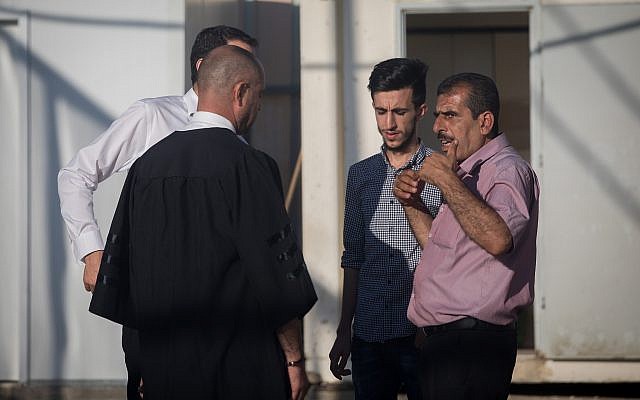The story of how Mahmoud Qadusa went from facing calls for his execution to possible release in just days shines light on biases Palestinian deal with in Israel’s justice system

On Wednesday, Mahmoud Qadusa appeared at the Ofer Military Court for the first time since being indicted for the rape of a seven-year-old Israeli girl.
But in the court of public opinion, the 46-year-old Palestinian custodian had been convicted the moment police lifted the gag order over their investigation on Sunday evening.
The details of the alleged crime rattled the country and led to thousands of posts on social media. Soccer moms, senior ministers and many in between expressed outrage over the suspect’s capacity to drag a young girl across town against her will and rape her as two friends pinned her down and laughed.
Education Minister Rafi Peretz, Transportation Minister Bezalel Smotrich and former defense minister Avigdor Liberman each went as far as to call for Qadusa’s execution.
Rumors spread that the actual indictment was even more shocking, but when the document was leaked to reporters on Monday, what appeared most shocking was how poorly investigators had done their homework.
By the time Qadusa left the Ofer prison courtroom late Wednesday, he appeared far closer to being released due to lack of evidence than receiving the death penalty, in a case that experts say is symptomatic of larger problems in the way Palestinians are treated by the police and courts, from hasty indictments to inherent biases.

Swiss cheese
The charge sheet against Qadusa had relied almost exclusively on the seven-year-old victim’s statement, included no forensic evidence to back her testimony and did not determine what day, week or even month the alleged rape had taken place.
Minutes from previous hearings showed that police had even changed their account as to where the crime had occurred and how the child had been transported there. The prosecution’s claim that the suspect dragged the victim crying against her will across the center of town in the middle of the day, without anyone seeing or saying something, baffled residents in the ultra-Orthodox settlement where the alleged victim lives. As in most settlements, Palestinian workers are not permitted to roam around on their own, let alone escort children.
Added to these complications was the testimony of the child investigator, who spoke with the victim and concluded in a court-submitted legal opinion that the girl’s identification of her attacker was not reliable and possibly influenced by her family.
What’s more, the teacher — who, the victim’s parents said, was with the girl when she “spontaneously” identified the suspect in school — was never questioned by police before the indictment was filed.
Despite the seemingly damning number of holes in their investigation — which one senior law enforcement official equated to Swiss cheese — no one in the local settlement’s police department found it necessary to address the weaknesses in their case before moving forward with the indictment against Qadusa on Sunday.

Unequal regard
The police’s conduct has led some to question whether similar hastiness to indict would have been exercised had the suspect been Jewish.
“The difference in legal rights between Jews and Arabs in the West Bank is one of night and day,” said Mordechai Kremnitzer, a criminal and constitutional law expert at the Israel Democracy Institute. He argued that as non-citizens, Palestinians “have no meaningful influence over their lives and are ruled by a foreign force.”
Even worse, he argued, law enforcement is biased to view fellow Israelis sympathetically, while assigning Palestinians a more “rival or enemy-like” status.
“It’s hard to believe that this reality would not influence how law enforcement deals with Palestinians… There’s room for fear that their treatment would not be equal to what Israelis experience,” Kremnitzer said.
And it’s not just police. Years of conflict means average Israelis also harbor inherent biases, making it easier for them to believe a Palestinian is capable of committing such a heinous crime, as opposed to one of their fellow Jewish citizens, he argued.
Each of these factors enabled a scenario, according to Kremnitzer, in which police rushed an indictment and then were forced to backtrack and announce they would reopen the investigation into the alleged rape in order to verify the suspicions against Qadusa.
“I have never heard of such a thing done after the indictment has already been submitted. You’re supposed to verify information before filing charges,” he said.

Two court systems for two peoples
Perhaps even worse than prejudice is the fact that Palestinians are forced to contend with a legal system that is stacked against them and further limits their rights, according to attorney Roni Pelli of the Association for Civil Rights in Israel.
While Palestinians and Israelis in the West Bank might be under the jurisdiction of the same police force, Israeli Jews are almost always tried in Israeli civilian courts, while Palestinians are prosecuted in a military court, which operates under different rules.
Those differences begin right after an arrest. Israeli law also requires a suspect to be brought before a judge for the first time in no more than 24 hours. For Palestinians under military law in the West Bank that number is doubled.
During that first hearing, military judges can order that suspects be held for 20 days after an initial arraignment hearing, five more days than prosecutors in civilian court are allowed to seek.
Pelli said prosecutors in military courts almost always end up asking to keep a suspect behind bars until the end of proceedings, a tactic only employed in civilian court if the suspect is deemed a flight or security risk.
“[Military prosecutors] are convinced that Palestinians won’t report to court,” she said.
Qadusa was in jail for over a month before the public even found out about the case and people could begin asking questions. In civilian court, such a situation would be nearly impossible in cases not clearly related to terror.

Pelli also argued that the nature of military trials, which for Palestinians take place in a foreign language before a judge in an army uniform, further creates an imbalance that works against the defendant.
The conviction rate for Palestinians in military courts in 2017 was 99.1 percent, according to the Central Bureau of Statistics. For Israelis in civilian court, the number that year was 82.3%.
Apathy for the devil
For Jewish Community Watch, an NGO that works to combat child sexual abuse, the ongoing rape investigation has been a point of particular frustration.
While she faulted police for bungling the probe, JCW director Shana Aaronson reserved much of her criticism for the broader Israeli public and their representatives, accusing them of only paying attention to violence against women when there is a possible nationalistic aspect.
“The reality is that no one would ever have heard or cared about this case [if the suspect had been Jewish] and it’s a very sick indictment of the community and the politicians in this country that they only care about child rape when the rapist is an Arab,” she said, clarifying that she did not intend to downplay the severity of the alleged case at hand.
According to statistics from the State Prosecutor’s Office compiled by the Association of Rape Crisis Centers in Israel, law enforcement investigated 821 suspected rape cases in 2017, and thousands more other allegations of sexual assault or harassment, including against minors.
Few of those cases made the news, let alone dominated the national conversation, and a vast majority of the cases were dropped, far from the public eye.
“We have worked for years trying to get authorities to take child rape in this country seriously,” Aaronson said, “yet [our pleas] fall on deaf ears and too often we see complete apathy.”



@ Adam Dalgliesh: Ted, this is such an outrageously biased and downright deceitful article. The author tells one ouright outragoues lie, and makes a series ouf extremely misleading statements based on that lie. He relies for his information on leaders of two ultra-leftist organization with a long history of opposing the occupation and “settlements,” and supporting the Palestinian-Arab claims to the “West Bank.” These groups are also very hostile to haredim, and this crime is a haredi settlement. is a haredi settlement.
The claim that there are “two court systems for two peoples” is an outright lie. There is only one court system in Judea-Samaria, the military court system. Jews as well as Arabs are always tried by military courts when they are residents of Judea-Samaria. In areas that have been incorporated into Israel, everyone , Jew or Arab, is tried in a civilian court–there are no “two court systems for two people in any area subject to Israeli jurisdiction. The only separate courts for Arabs are those run by the “State of Palestine” and Hamas.
This is another outrageous , outright lie. I guess that makes true. All Jewish residents of Judea-Smaria who are accused of crimes are tried by military courts. Both Jews and Arabs accused of crimes who are residents of ‘incorporated” Israel are tried in civilian courts.
Again, this “expert” falsely suggests that these rules are only applied to Arab suspects.
Pelli said prosecutors in military courts almost always end up asking to keep a suspect behind bars until the end of proceedings, a tactic only employed in civilian court if the suspect is deemed a flight or security risk.
Oh, Gee, what could possibly have given them that idea?
As to the facts of the case regarding the rape of the 7-year-old girl, I don’t know anything more than anyone else. Press reports about the case have been contradictory and vague. But this particular article, given the author’s extreme bias and dishonesty, is completely useless as a source of information about this incident.
Ted, I think you should contact the Honenu organization, which represents Jewish ‘security” defendants in both military and civilian courts, and ask that one of their attorneys, such as Itimar Ben-Gvir, to write a full rebuttal to this lying article.
@ Adam Dalgliesh:
This highly qualified Kremnitzer is both a fool and a liar. He forgets about the DUMA events, where there are still Jewish innocent victims being held without charges.for years now. If ever there was an example of “Rush To Judgement… THAT was it.
@ Adam Dalgliesh:Reporting on crimes in inaccurate everywhere reporters many times make up stories because they do not know the facts. Sometimes when the know the facts, the facts are so bland the reporters get very creative and just write so more interesting than the actual facts.
If one wants the truth it is very hard to rely on newspapers when it is crimes especially while the investigation is on going.
Even your assumption or conclusion that you know the police bungled the investigation likely reflects your prejudice (correct me if I am wrong) because how would you know this from garbled and inconsistent facts reported.
Hypothetical- If it is correct that as was reported in some cases that the parents did not tell the police for about 2 months about the supposed rape, it would make it very difficult to obtain any forensic evidence that would confirm the girls story.
This is an extremely biased account, and I believe that much of it is inaccurate. The bers of the KnessetJews of Judea=Samaria certainly are subject to a military administration and military courts. The so=called “Civil Administration is appointed by the Minister of Defense and staffed mainly by military officers. Members of the Knesset have repeatedly introduced legislation to allow Jews and other Israeli citizens in Judea-Samaria to be tried in regular Israeli civilian courts. But the Knesset has failed to adopt any of these proposed laws. The Ministry of Defense, the Civil Administration and the Israeli Supreme Court have all rejections to give Israeli citizens in Judea=Samaria this right.
The military administration frequently expels ‘settlers” from their homes in Judea=Samaria for various lengths of time, forcing them to relocate in pre-1967 Israel, abandon their families who remain there, and be forced to give up there jobs there, since they uthorare not even allowed to commute to work.
As for the case of the raped little girl, the author omits from the account that the psychologist appointed by the court to examine her concluded that she was telling the truth, since she offered details of her experience that no 7-year-old who had not actually suffered a rape could possibly know about. One reason they decided to indict the janitor was because the court-appointed psychologist considered the girls account credible.
Accounts in th epress about this incident have been so varied and contradictory that it is very difficult to know what actually happened, or even when it happened. There seems to be a lot of fake news being reported. One thing that nearly everyone agree about, though, is that the police bungled the investigation.